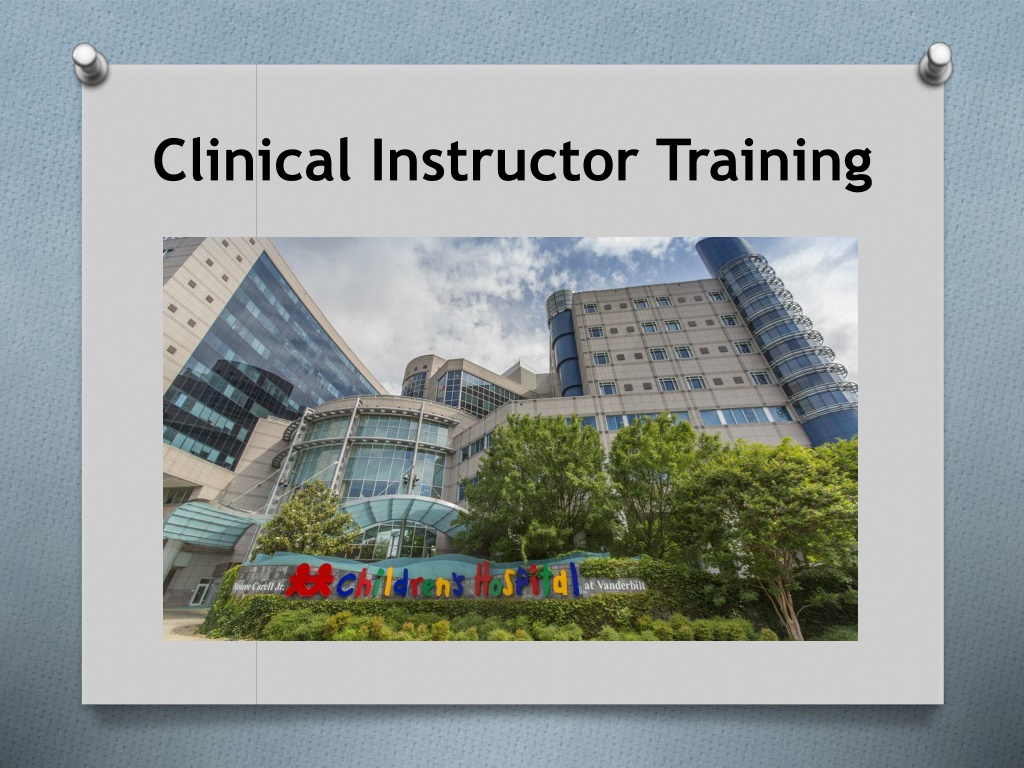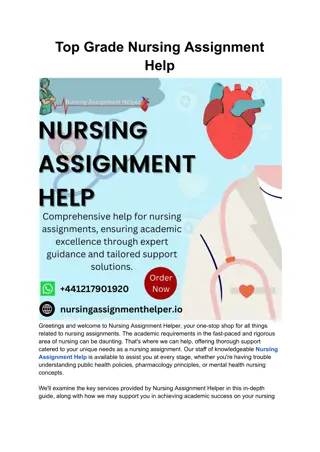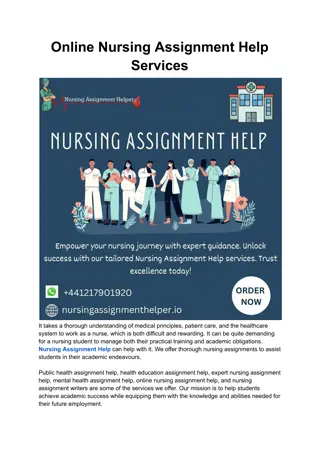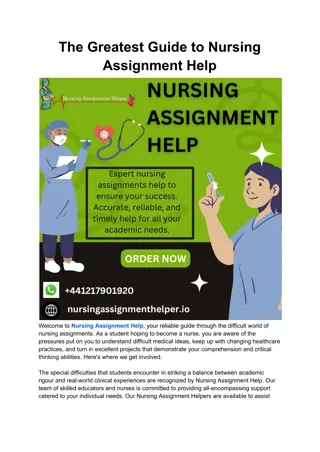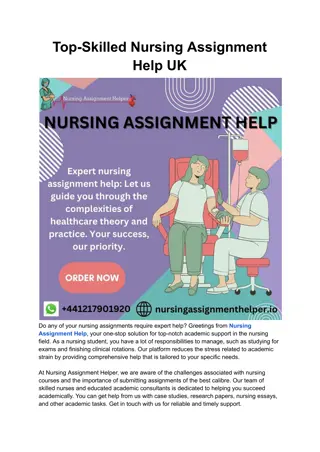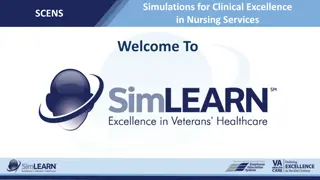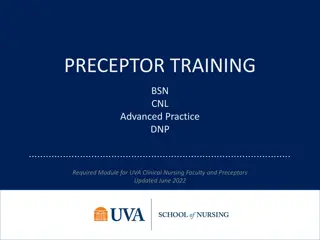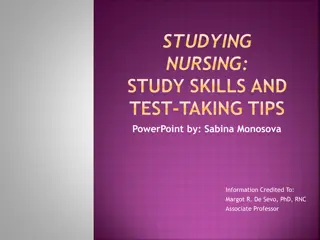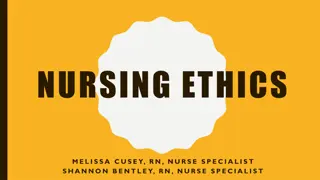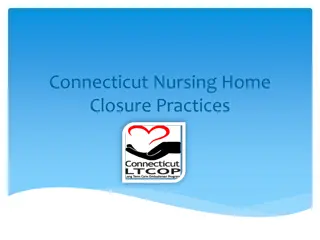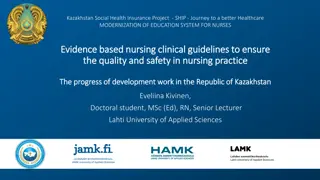Clinical Instructor Training and Nursing Education Guidelines
Clinical Instructor Training program and Nursing Education guidelines at Vanderbilt University Medical Center including training requirements, feedback procedures, conflict of interest policies, clinical reminders, bedside RN responsibilities, and patient assignment protocols.
- Clinical Education
- Nursing Training
- Vanderbilt University
- Healthcare Guidelines
- Professional Development
Download Presentation

Please find below an Image/Link to download the presentation.
The content on the website is provided AS IS for your information and personal use only. It may not be sold, licensed, or shared on other websites without obtaining consent from the author. Download presentation by click this link. If you encounter any issues during the download, it is possible that the publisher has removed the file from their server.
E N D
Presentation Transcript
Nursing Education Marissa L. Brown, Director Clinical Education & Professional Development Amanda Smith, Nursing Education Specialist O PMAC: 7A,7B, & 7C Laura Parks, Nursing Education Specialist O PSTAM: 8A, 8B, & 8C
Training Requirements O Web-based Instructor Training O Shadowing Experience O 12-24 hours if non-Vanderbilt employee O 8 hours if Vanderbilt employee O Competency Sheets O Completed before beginning clinicals O Can be validated by unit educator or staff nurse O Email to student.placement@vumc.org
Feedback Clinical Instructor: O Will be given in real time if possible O Information will be sent through school designee and NEPD Student: O Will be given in real time if possible O Information will be given to instructor if possible O Otherwise, information will be sent through school designee Unit/RN: O Information will be given to school designee or NEPD staff
Conflict of Interest Vanderbilt employee should: O Not engage in Vanderbilt business while serving as a clinical instructor O Use a personal email address for school communications O Submit a document disclosing the potential COI O Work within your current scope of practice O Wear a Vanderbilt Visitor ID during clinicals
Bedside RN Primary Responsibilities: O Administer or Cosign blood and/or blood products O Perform Point of Care Testing O EVD Management O Chest Tube Management O PCA/Epidural Management O Central Line Dressing Changes O Epilepsy Monitoring Unit Patient Care
Patient Assignments O Contact the Staffing Leader: O 2100-2300 for AM clinicals O by 1245 for PM clinicals O Fill out the Assignment sheet and post at the Nurses Station O Review patients together to determine if the assignment and acuity will meet your objectives based on the student skill mix O EMU, Transitional, Negative Isolation, Behavioral Health and Radiation patients should not be assigned
Patient Assignments With the Staff Nurses: O Communicate throughout the clinical experience O Outline expectations O Review student scope of practice O Make a plan with the RN if you need assistance, are changing the patient plan, or if have concerns O Students and Instructors should check out with the RN & CPs before leaving the floor
During Clinicals O All students must be accompanied by the instructor when they are on the floor, giving medications, and performing technical skills during the rotational experience. O All documentation is to be co-signed by the instructor. O In the event of emergencies, the clinical instructor will receive direction from the Staffing Leader and will provide supervision to the students
Sharing Space O Students should work outside of the patient rooms and bring limited personal items to the clinical environment Fishbowls/Breakrooms/Quiet Rooms: O Are not a secure location for student belongings O Should not be used for student conferences or gathering locations
Social Media & Privacy O Cell Phones are not permitted in the patient work area. Personal calls should be taken off the unit. O Resources can be found in the fishbowls, med rooms, or online O All printed patient material must be disposed of at the end of clinicals. O Name tags must be collected by the schools and destroyed at the end of the clinical experience.
Student Injury O Fluid Splash/Needle Stick: Occupational Health during business hours O Slip, Trips, Falls: Adult Emergency Room O The student s personal insurance will be billed O Occ Health/Adult Emergency Room will fill outa TN First Report of Work Injury
Documentation Reminders All documentation is to be co-signed by the instructor.
Documentation Expectations Outside of Scope O Physical assessments q day O Pain scores q4 O IV site checks q1 O POCT O Braden scores O Pediatric Falls Safety O GCS O Vital Signs q4 O Intake and Output q2 O Activities of Daily Living O Nutrition by Nursing
Measurements O Patients O < 3 years: length, weight, and HC on all admissions O >3 years: height and weight O Patients are usually divided by age for day shift/night shift measurements O Some patients are weighed at a specific time based on physician order.
Conclusion O Please let us know if you have any questions O Our goal is for everyone to have a great clinical experience. O We look forward to working with you.
